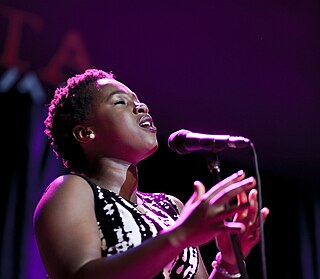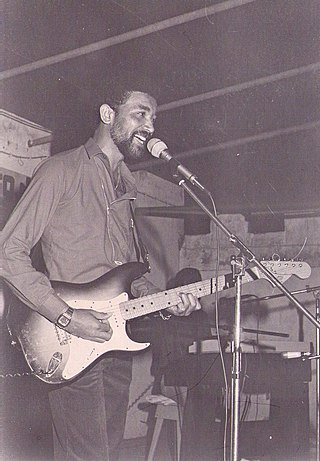Related Research Articles

Cape Verde is known internationally for morna, a form of folk music usually sung in the Cape Verdean Creole, accompanied by clarinet, violin, guitar and cavaquinho. Funaná, Coladeira, Batuque and Cabo love are other musical forms.

The morna is a music and dance genre from Cape Verde. It was proclaimed Intangible Cultural Heritage of Humanity by UNESCO on December 11, 2019.

Manuel d' Novas was a Cape Verdean poet and composer.
The coladeira is a music genre from the Cape Verde islands in the central Atlantic Ocean.

The culture of Cape Verde is rich, with a range of customs and practices common in the islands.

Cesária ÉvoraGCIH was a Cape Verdean singer known for singing morna, a genre of music from Cape Verde, in her native Cape Verdean Creole. Her songs were often devoted to themes of love, homesickness, nostalgia, and the history of the Cape Verdean people. She was known for performing barefoot and for her habit of smoking and drinking on stage during intermissions. Évora's music has received many accolades, including a Grammy Award in 2004, and it has influenced many Cape Verde diaspora musicians as well as American pop singer Madonna. Évora is also known as Cizé, the Barefoot Diva, and the Queen of Morna.

Café Atlantico is the seventh album by the Cape Verdean singer-songwriter Cesária Évora. Café Atlantico is a reference to her home where she frequently entertained guests.
Adriano Gonçalves, known by his stage name Bana and called the "King of Morna", was a Cape Verdean singer and performer of the morna style, the plaintive, melodic lament which is a staple musical style of the country.
Gerard "Boy" Mendes is a Senegalese musician of Cape Verdean descent. He was born in Dakar, Senegal and was raised in the city's Cape Verdean diaspora community. As a child, he grew up in a household filled with the sounds of the native morna and coladeira. But he was also exposed to the music of his adopted land and to the music of Mali, Guinea and other west African countries. His early music career even included singing rock, rhythm & blues, and Cuban music, which were all popular genres in Senegal at the time. Mendes eventually settled in France where he teamed up with his brother Jean-Claude, Manú Lima, and Luís Silva to form Cabo Verde Show, one of the most popular Cape Verdean bands of all time, he made several albums including Di oro in 1995 and Noite de morabeza in 1999, some of them were released by Lusafrica recording company. Mendes was later married and had several children including Mika Mendes, a zouk singer.

Carmen Souza is a Portuguese jazz singer and songwriter of Cape Verdean heritage. She combines traditional forms of Cape Verde with contemporary and traditional jazz.
Francisco Xavier da Cruz, also known as B. Leza or Beleza was a Cape Verdean writer, composer and singer of morna music..

Epifânia de Freitas Silva Ramos Évora, better known as Dona Tututa or Tututa Évora was a Cape Verdean composer and a pianist.
Gardénia Benrós is a Cape Verdean singer.

Elida Almeida is a Cape Verdean singer.
The Cape Verde Music Awards is an annual music award ceremony that takes place every year. The award ceremony takes place in the capital city of Praia, Cape Verde. It is also broadcast on TCV.

Mário Lúcio Sousa is a Capeverdean singer, composer, writer, politician and a painter. From 2011 to 2016, he was the Capeverdean Minister of Culture.

Simentera were a Capeverdean band or a music group performing traditional and world music and was one of the most famous groups in Cape Verde.

Djô d'Eloy born Adolfo de Jon Xalino was a Cape Verdean singer, composer and guitarist. He belonged to the Xalino family of singers. His greatest singles included "Arriola" and "Grandeza", both appeared in the album Nos Festa in 1981. he was of the Xalino family. His most famous singles were "Reanima" and "Celina". Alongside Bana, he was the founder of the nation's first music festival, the Baía das Gatas Music Festival.

Val Xalino is a Capeverdean singer and producer who currently resides in Gothenburg, Sweden. He is the father of the Cape Verdean singer and producer Robert Xalino.
References
- ↑ Gilbert, Andrew (2009-05-26), "Maria De Barros opens a window to Cape Verde", Seattle Times, archived from the original on 2009-06-12, retrieved 2018-09-13
- 1 2 3 4 5 6 7 8 9 10 Georg Leitner Productions GmbH (2018). "Maria de Barros". www.womex.com. Piranha Arts AG. Retrieved October 11, 2018.
- ↑ "Cantora cabo-verdiana Maria de Barros nomeada para prémios Lunas del Auditório". Africanidade (in Portuguese). Archived from the original on 5 January 2009. Retrieved 18 August 2010.